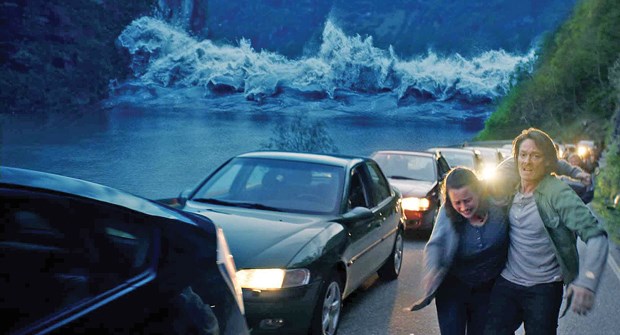The Wave. Directed by Roar Uthaug. Starring Kristoffer Joner and Ane Dahl Torp. Rating: 6 (out of 10)
In the wake of the tsunami, you probably reconsidered that trip to Japan, while Thailand is still trying to rebuild its tourism industry more than a decade later. Now catastrophobiacs can add scenic Norway to their no-fly list.
Director Roar Uthaug mines facts and footage of a 1905 rockslide and tsunami that killed 63 people to posit that it's just a matter of time before disaster strikes again, sending chunks of mountain cascading down onto the scenic fjords and cruise ships below.
A crew of geologists monitors 300 unstable hillsides, the most active of which is Akerneset; even still, computer solitaire is generally as exciting as things get at the region's early warning centre. Kristian (The Revenant's Kristoffer Joner, looking here like a tidier version of Daryl from Walking Dead) was the team's most diligent worker but he has taken a job in the oil industry, trading his "soulful" character home for an apartment on the North Sea that is run by a smartphone app.
Co-workers predict Kristian will be back: "These mountains, once they grab hold of you, they never let go," says one. After the farewell cake has been eaten, a seemingly innocuous alarm rings; the geologists tell Kristian to go home, already.
Kristian's family is reluctantly moving with him. The house is packed up and wife Idun (Ane Dahl Torp) plans to join her husband, teenage son Sondre and young daughter Julia (Jonas Hoff Ofteboro, Edith Haagenrud-Sande) in a few days after wrapping up her job at the local hotel.
But Kristian can't shake the prescient feeling that something is not right, running through scenarios in which a an 80-metre high wave wipes out the town of Geiranger - and his whole family - with only 10 minutes' warning. Thus the boy-whocried-wolf quandary: who wants to be the guy who pushes the alarm in the middle of tourist season?
Disaster does strike, of course, and the family is split in two, doubling the chances that someone's gonna get it before the waters recede: Kristian and Julia do a blind sprint up a mountain hoping to outrun the wave, while Idun helps evacuate the guests at the hotel and sullen Sondre skateboards in the hotel basement with his headphones on, oblivious to impending doom.
There will be comparisons to 2012's The Impossible, a far superior film admittedly working with a far bigger budget. And while last year's avalanche drama Force Majeure focused on the psychological aftermath of disaster, The Wave stays true to formula as an oldfashioned disaster movie, complete with people trying to outrun waves in a hotel hallway.
The tsunami's nighttime arrival muddies the waters, so to speak, of some of the effects, but overall the CG work rivals many of the Hollywood natural-disaster films out there. Despite some editing missteps and fairly straightforward characterization, Norway's official submission for Best Foreign Language Film at the Academy Awards (though not nominated) should garner interest among arthouse cinephiles and doomsday prophets alike. The Wave may be at once one of the greatest advertisements and biggest deterrents to Norwegian tourism ever.



